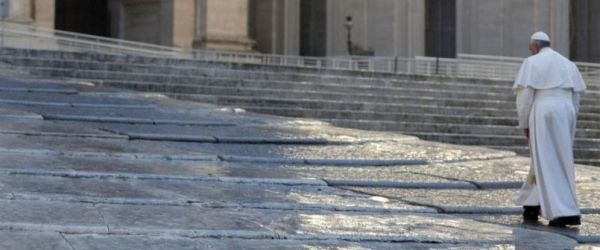In today’s Gospel passage (cf. Jn 10:27-30) Jesus is presented to us as the true Shepherd of the People of God. He speaks about the relationship that binds him to the sheep of the flock, namely, to his disciples, and he emphasizes the fact that it is a relationship of mutual recognition. “My sheep” — he says — “hear my voice, and I know them, and they follow me; and I give them eternal life, and they shall never perish” (vv. 27-28). In carefully reading this phrase, we see that Jesus’ work is explained in several actions: Jesus speaks; Jesus knows; Jesus gives eternal life; Jesus safeguards.
The Good Shepherd — Jesus — is attentive to each one of us; he seeks us and loves us, addresses his Word to us, knowing the depths of our heart, our desires and our hopes, as well as our failures and disappointments. He accepts us and loves us as we are, with our merits and our faults. He “gives eternal life” to each one of us: that is, he offers us the opportunity to live a full life, without end. Moreover, he safeguards us and leads us lovingly, helping us to cross impervious paths and the sometimes dangerous roads that appear in life.
The verbs and actions that describe the way in which Jesus, the Good Shepherd, interacts with us correspond to the verbs that relate to the sheep, namely us: “hear my voice”, “follow me”. They are actions that show how we must correspond to the tender and caring attitudes of the Lord. Indeed, hearing and recognizing his voice, implies intimacy with him, which is strengthened in prayer, in the heart-to-heart encounter with the divine Master and Shepherd of our souls. This intimacy with Jesus, this openness, speaking with Jesus, reinforces in us the desire to follow him, by emerging from the labyrinth of errant ways, abandoning selfish behaviour in order to set out on new paths of fraternity and of self-giving, in imitation of him.
Let us not forget that Jesus is the only Shepherd who speaks to us, knows us, gives us eternal life and safeguards us. We are the only flock and we only have to strive to hear his voice, while he lovingly examines the sincerity of our hearts. And from this constant intimacy with our Shepherd, from this colloquy with him, springs the joy of following him, allowing ourselves to be led to the fullness of eternal life.
Let us now turn to Mary, Mother of Christ the Good Shepherd. May she, who readily responded to God’s call, help in particular those who are called to the priesthood and to consecrated life to joyfully and willingly accept Christ’s call to be his more direct coworkers in proclaiming the Gospel and at the service of the Kingdom of God in this age of ours.
[Pope Francis, Regina Coeli 12 May 2019]












